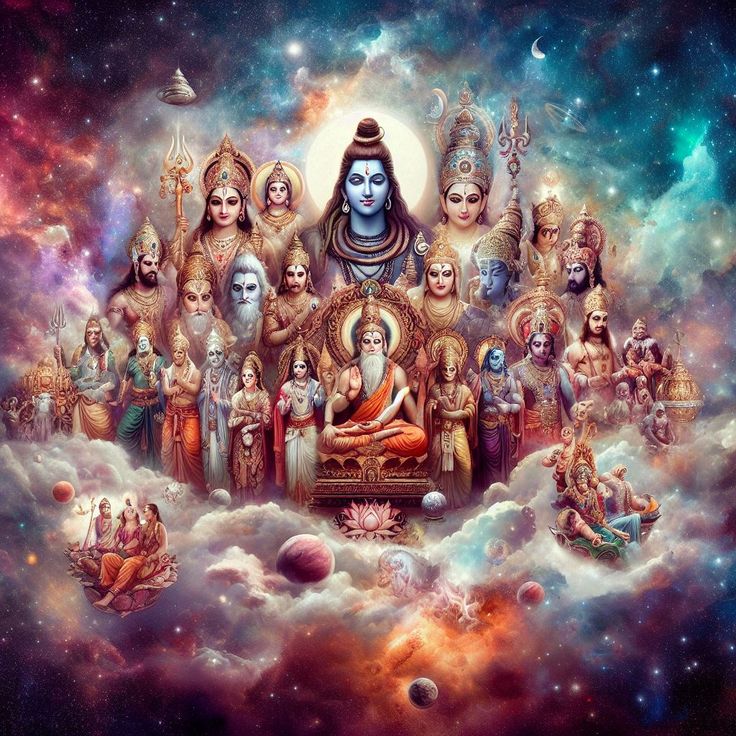Powerful Hindu Goddesses Who Shape Society: Their Impact, History & Significance
Hindu Goddesses: Hinduism, one of the world’s oldest and most diverse religions, has a rich pantheon of deities, among which the Hindu goddesses hold a central role. These goddesses are revered not only as divine beings but also as representations of various powers, virtues, and cosmic forces that shape both the material and spiritual worlds. Here’s a deep dive into the history, significance, observance, and impacts of some of the most influential Hindu goddesses.
1. Hindu Goddesses Durga – The Invincible Protector
Durga is one of the most powerful goddesses in Hinduism. Often depicted riding a lion and wielding various weapons, she is the embodiment of feminine strength, courage, and protection. Durga’s victory over the demon Mahishasura symbolizes the triumph of good over evil. Her devotees observe the festival of Durga Puja, a major celebration in India, which marks her victory and the divine power that she represents. Durga inspires many to face life’s challenges with courage and resilience.
2. Hindu Goddesses Lakshmi – The Goddess of Wealth and Prosperity
Lakshmi is the goddess of wealth, prosperity, and well-being, and she plays a vital role in Hindu households. She is often worshipped during Diwali, the festival of lights, where people pray for financial prosperity and good fortune. Lakshmi’s presence in daily life is profound, as she represents not just material wealth, but also spiritual richness, such as peace and contentment. Observing her worship helps devotees focus on achieving balance in both their material and spiritual pursuits.
3. Hindu Goddesses Saraswati – The Goddess of Wisdom and Arts
Saraswati is the goddess of learning, knowledge, music, and arts. She is revered by students, artists, and scholars, as her blessings are believed to grant wisdom and creative inspiration. Saraswati Puja, celebrated during Vasant Panchami, is a time when devotees pray for intellectual growth and artistic ability. Her influence is seen in the importance placed on education and knowledge within Hindu culture, encouraging people to strive for wisdom and enlightenment.
4. Hindu Goddesses Parvati – The Mother Goddess
Parvati, the consort of Lord Shiva, is a symbol of love, fertility, and devotion. She embodies the essence of motherhood and is considered the source of all creation. Her role as a mother and wife showcases the importance of nurturing relationships and family life. The festivals of Maha Shivaratri and Karva Chauth are dedicated to her, highlighting her significance in sustaining love, marriage, and harmony in society.
5. Hindu Goddesses Kali – The Fierce Protector and Destroyer
Kali is often seen as a terrifying figure, but she is also a goddess of transformation and liberation. She is depicted with a dark complexion, a necklace of skulls, and a sword, symbolizing the destruction of evil forces. Kali’s role is not to spread fear, but to liberate her devotees from ignorance and attachments, urging them to face their deepest fears and emerge stronger. Kali’s worship emphasizes the importance of overcoming personal demons to achieve spiritual growth.
6. Hindu Goddesses Radha – The Goddess of Love and Devotion
Radha, the beloved consort of Lord Krishna, is the embodiment of devotion, love, and purity. Her relationship with Krishna symbolizes the soul’s yearning for God, highlighting the spiritual importance of love and devotion. Radha’s worship encourages followers to cultivate unconditional love and devotion in their lives. Her story is central to many devotional practices, especially in the Vaishnavite tradition, emphasizing that love for the divine is the highest form of worship.
7. Hindu Goddesses Ganga – The Sacred River Goddess
Ganga is not only the goddess of the sacred river Ganges but also represents purity and divine flow. The river is considered holy, and bathing in its waters is believed to cleanse one of sins. Ganga’s significance in Hindu culture is profound, as she is also considered a source of healing and renewal. Her worship reminds followers of the cyclical nature of life, the importance of purification, and the continuous flow of divine blessings.
8. Hindu Goddesses Annapurna – The Goddess of Food and Nourishment
Annapurna is the goddess of food, nourishment, and sustenance. She is considered the provider of all that is necessary for survival. Her worship underscores the importance of gratitude for food and resources. In a world where food insecurity is prevalent, her devotees pray for abundance and the sharing of resources with those in need.
9. Hindu Goddesses Bhuvaneshwari – The Goddess of the Universe
Bhuvaneshwari represents the creation of the universe and the protection of the cosmos. She is often depicted sitting on a lotus, symbolizing the potential for the universe to unfold. Bhuvaneshwari’s worship is significant in reminding devotees of the interconnectedness of all life and the importance of harmony within the universe. Her role in shaping the world highlights the importance of environmental and social responsibility.
10. Hindu Goddesses Tripura Sundari – The Goddess of Beauty and Inner Peace
Tripura Sundari is the goddess of beauty, love, and inner peace. She represents both outer and inner beauty and is worshipped by those seeking balance and harmony in their lives. Her name translates to “the beauty of the three worlds,” symbolizing her all-encompassing power. Devotees often seek her blessings for inner peace, spiritual growth, and a life filled with love and joy.
Significance and Impact of Hindu Goddesses
The worship of Hindu goddesses plays a crucial role in shaping the values and practices of society. These deities are seen as protectors, nurturers, and symbols of feminine power. They are not only revered during specific festivals but are also integral to daily life, inspiring individuals to live with greater purpose and integrity. The lessons taught by these goddesses—whether about love, strength, wisdom, or transformation—have enduring relevance and continue to inspire people across the world.
Conclusion: Hindu Goddesses
The Hindu goddesses represent far more than mere figures of worship; they are the archetypes of the divine feminine and serve as profound sources of guidance and inspiration. By embodying various virtues like courage, wisdom, wealth, and love, these goddesses provide timeless teachings that influence both spiritual practices and societal values. Whether through daily observance, festivals, or teachings, their impact is felt in every aspect of life, offering a powerful and transformative force for individuals and communities alike.










